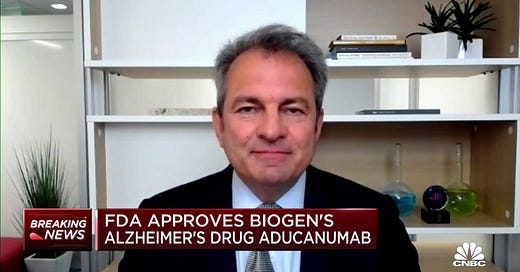If you’re like us, you haven’t been able to stop thinking about Biogen’s Aduhelm since it received FDA approval on Monday. Today’s newsletter is a continuation of last week’s newsletter where we’ll explore the ramifications of approval. If you haven’t already read last week’s Pulse, we highly recommend you start there.
Today’s Pulse is 700 words, or a 6 minute read.
If you like what you read, make sure to drag the email to your “primary” tab!
PharmaFDA approves Biogen’s Aduhelm
The pulse:
The FDA continues to receive backlash on the heels of its enormously contentious decision to approve Aduhelm. Who could have seen that one coming?
How did it get approved?
We’re as shocked as you (and all of biotech) are. To review, the FDA’s Advisory Committee had already discussed Aduhelm back in November 2020. Back then, 10 of the 11 members voted against approval, and one abstained. It’s true that the FDA does not always follow the advice of such committees - about 20% of the time, the agency has gone against the advisory committee. However, there are two important distinctions to note from this case and the usual — these conflicts normally occur when the advisory panel vote is much closer, and it’s usually the FDA that is more strict (against approval). In other words, to approve Aduhelm, the FDA essentially burned its own rulebook.
What’s going on over at Biogen?
Biogen has announced a list price for the drug of $56,000 per year, about five times the price Wall Street analysts had predicted. For context, the Institute for Clinical and Economic Review estimates the drug would be cost-effective at a price below $8,300. The broad approval is for any and all of the 6 million Americans with Alzheimer’s. As noted by writers at STAT, if even one-third of these patients started treatment with Aduhelm, Biogen stands to gain $112 billion, potentially making Aduhelm the most profitable drug in history.
Still, that requires that someone is actually willing to pay for the drug. FDA approval means a drug will be automatically covered by Medicare, which covers about 80% of Alzheimer’s patients. However, Medicare could establish restrictive eligibility criteria that would limit usage. Additionally, Medicare only covers 80% of the cost of a drug. Patients have to either pay the other 20% out of pocket (a price tag of $11,200 in the case of Aduhelm) or, as many do, have it covered by supplemental insurance. This is likely to be the trickier part — a number of other private large insurance companies have already denounced the price of the drug and could either follow suit with restrictive criteria or not cover Aduhelm at all.
Despite this, Biogen’s stock has increased by about 40% since last Friday.
Biogen CEO Michel Vounatsos on CNBC following the FDA announcement. Source: CNBC
What’s going on over at the FDA?
Many people are not pleased, to put it lightly. Three members of the advisory panel that voted against approval last November have resigned. One member, Aaron Kesselheim, noted that the decision “was probably the worst drug approval decision in recent U.S. history.”
In an attempt to assuage concerns, the FDA has asked Biogen to complete a confirmatory trial. Biogen CEO Michel Vounatsos announced live on CNBC that the company was given up to nine years to complete the study by October 2030. To many, his cavalier remarks seemed to reflect a lack of urgency in conducting the trial; indeed, Biogen’s R&D chief Al Sandrock has admitted the protocol for the trial has not yet been finalized.
And what’s going on for everyone else in biotech?
There’s no doubt that this decision has altered the perception behind an FDA approval. Some are hopeful that this could mean the FDA will accelerate public access to medicines in the future. A vast majority of the biotech world is concerned that this may set a new precedent of approval based on incomplete data and unsubstantiated claims of efficacy.
Bottom line it for me:
The FDA has approved Biogen’s new Alzheimer’s drug Aduhelm, likely fully aware of the backlash it would receive. Whether payers will cover the cost and what this means for the FDA’s approval process going forward remains to be seen.





